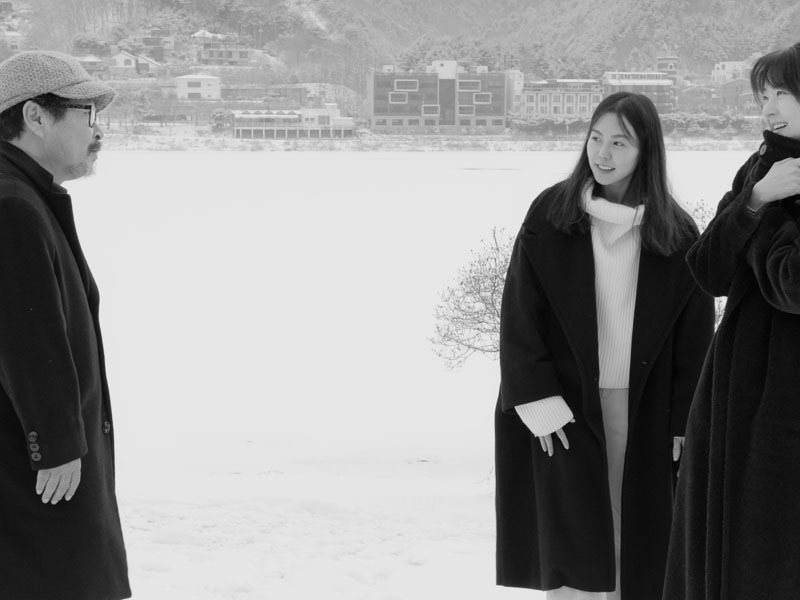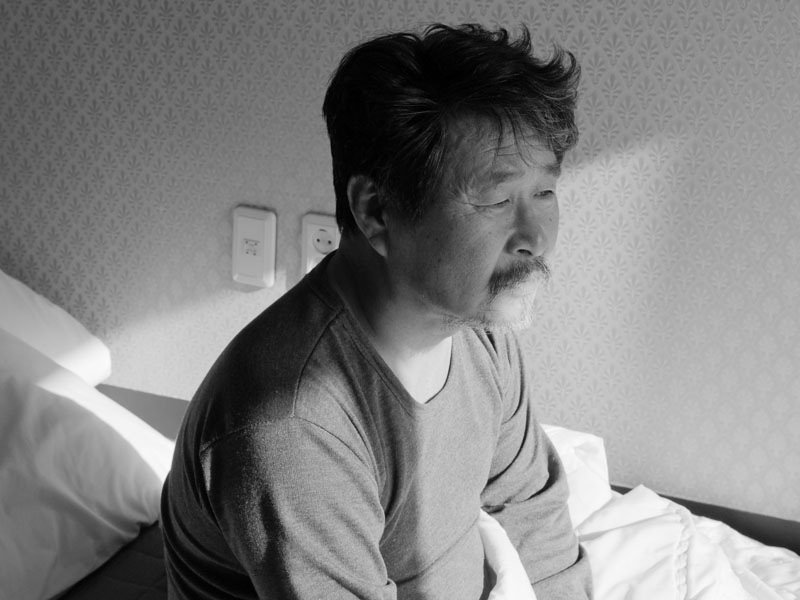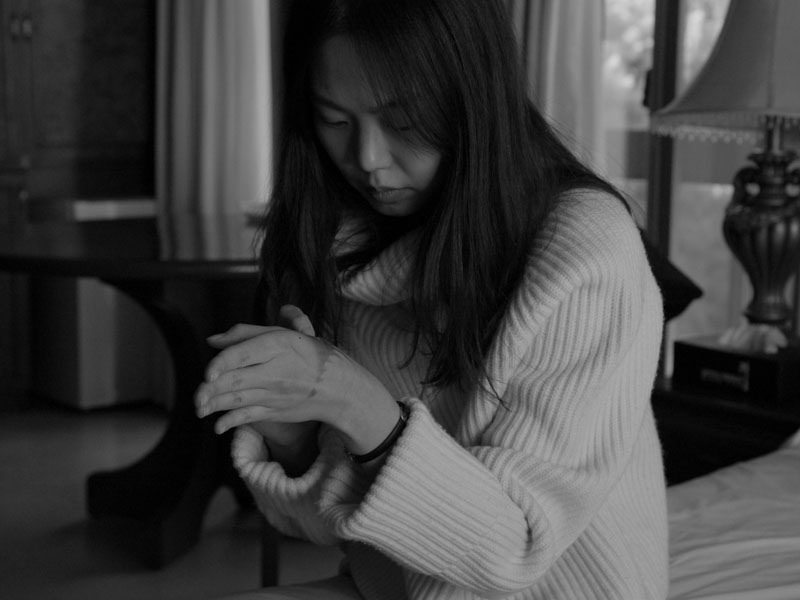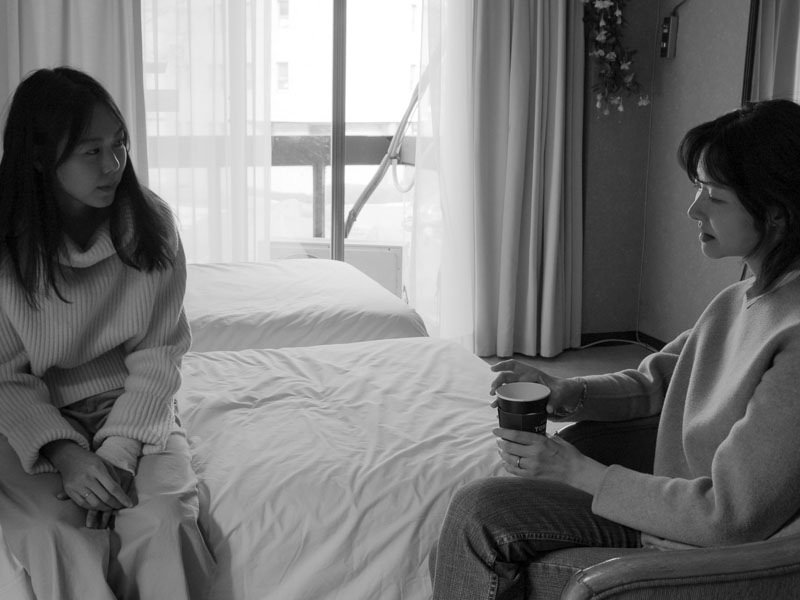|
By Danny Sheahan It can be tough being socially awkward: it can be difficult relating to other people, it can be difficult to form new connections with new people, and it can be difficult to really talk about one’s own personal feelings with people, even if it’s with people who are very close, such as family and friends. However, from an outside perspective, awkwardness can be quite funny. Awkward comedy has seen a steady rise in popularity in recent years, with television programs such as Comedy Central’s Nathan for You or Adult Swim’s The Eric Andre Show, using awkward social interactions as the basis of their humor, focusing on the reactions of the uncomfortable victim. There seems to be something funny about people getting into uncomfortable situations, or seeing these people’s reactions when they find themselves in awkward positions. It’s this form of comedy that makes South Korean Hong Sang-soo’s Hotel by the River (2018), or known by its Korean name Gangbyun Hotel, such a successful comedy-drama. The film had its North American premiere screening at the 2018 Toronto International Film Festival as part of the “Masters” programme, which screens some of the latest films from influential art-house filmmakers from across the globe. © TIFF Trailers | YouTube The film, which is presented in black and white, tells the story of a famous poet who’s decided to stay in a nice hotel overlooking the Han River for two weeks. His sons arrive to visit him after years of being estranged, all while a young woman, also staying in the hotel, calls up her friend to help her deal with the aftermath of leaving a destructive relationship. These characters do small things, like meet up for coffee, take naps, go for walks, eat dinner, and talk about whatever is on their minds. The men are constantly losing each other, while the two women are never apart. The poet finds these women and thinks they are so beautiful that they might inspire a new poem for him to write. Writer-director Hong Sang-soo’s body of film work tells stories of similar scale and intimacy to this film, with emphasis on social interactions between average people. With a career that spans over 20 years, with 23 feature length films and 3 short films, Hong Sang-soo has cemented his international renown in the art-house film world, directing films like The Power of Kangwon Province (1998), Woman is the Future of Man (2004), and Hahaha (2010) that have all screened at the Cannes Film Festival, with Hahaha winning the top prize in the Un Certain Regard category in 2010. “Art-house” film, as a genre, usually refers to any type of film that intentionally goes against the traditional rules and conventions of mainstream filmmaking. “Art-house” film offers a unique perspective on filmic elements like cinematography, editing or even storytelling. Hong Sang-soo’s Hotel by the River would definitely be described as an unconventional film for a number of reasons. Let’s explore those reasons. The use of long takes is probably the most noticeable unconventional filming technique used in the film. Long takes are shots that last for extended periods of time, often times significantly longer than shots in most conventional films. For example, the longest length for a shot in a typical action film may be around 10-15 seconds, depending on what kind of scene is being filmed. In Hotel by the River, some scenes between characters are filmed with only one shot entirely. These shots will last for a few minutes at a time, which feels much longer when actually watching it on the screen. The use of long takes in the film perfectly captures the humor of the awkwardness between the characters’ interactions. Something awkward will happen and the camera will stay fixed on the situation, not shying away from the awkward moment and giving the audience time to notice and laugh at the situation. Also, the use of long takes in filmmaking is very demanding on the actors and their performances. In Hotel by the River, the actors confidently and effectively perform as their characters and the audience watches each performance as it happens, as if in real time on a stage. All of the principal actors in the film deserve praise for their committed and passionate performances. Another unconventional stylistic choice comes from the lack of a diverse musical score. Most of the film is devoid of music, except for one piece of score that re-appears at key moments in the plot. Usually the music scores a moment of character action with no dialogue, which, oddly enough, gives the impression that the musical score is like another character in the story, that appears to remind the audience of what they should think about at whichever moment the music appears. The score never gives the audience any cues on how to feel during the film, as many Hollywood film scores have a tendency to enhance the emotional weight of certain scenes. The scenes in Hotel by the River genuinely speak for themselves in terms of what audience members should get from them, and, thankfully, no amount of music can change or alter that fact. Finally, it’s the overall feeling of ambiguity and ambivalence in the tone of the film that really sets it apart from more conventional stories. The film’s scenes play out like the film is a drama, but to just classify the film as a drama would be wholly inaccurate because there are so many scenes that are really funny. However, despite being a funny film, to call it comedy would also be inaccurate because the comedy does not arise from jokes with punch lines. The funny interactions between characters and the funny things that characters say in Hotel by the River are such small moments and things that would realistically happen within day-to-day interactions, especially between characters who have been estranged for years (like the poet and his sons), or characters who talk excitedly about the famous people they’ve met (like the two beautiful women). What results is an overall ambivalent tone throughout the film, giving the audience mixed signals on exactly how good they should feel about the film they’re watching or how bad they should feel about certain characters’ personal feelings and revelations. Hong Sang-soo successfully creates unconventional feeling in the audience with Hotel by the River by using unconventional filmmaking techniques and an unconventional use of tone in storytelling, to create a truly remarkable film that, in the grand scheme of things, doesn’t really add up to much at all. There is a genuine beauty to that though, and that’s why the film is a must-see experience.
*Editor’s Note: Hotel by the River as screened at the Toronto International Film Festival ‘18. VIBE105 is an Official Media partner for the 2018 Toronto International Film Festival. Check the latest film festival coverage on all blogs and on social media @vibe105to. |
Recent Posts
Categories
All
Archives
February 2022
|
|
GET THE APP!
Listen to VIBE 105 anywhere you go!
|
OUR STATION
|
TUNE IN RADIO
|
STAY CONNECTED
|
Copyright © 2021 Canadian Centre for Civic Media and Arts Development Inc. Except where otherwise noted, presentation of content on this site is protected by copyright law and redistribution without consent or written permission of the sponsor is strictly prohibited.






 RSS Feed
RSS Feed


